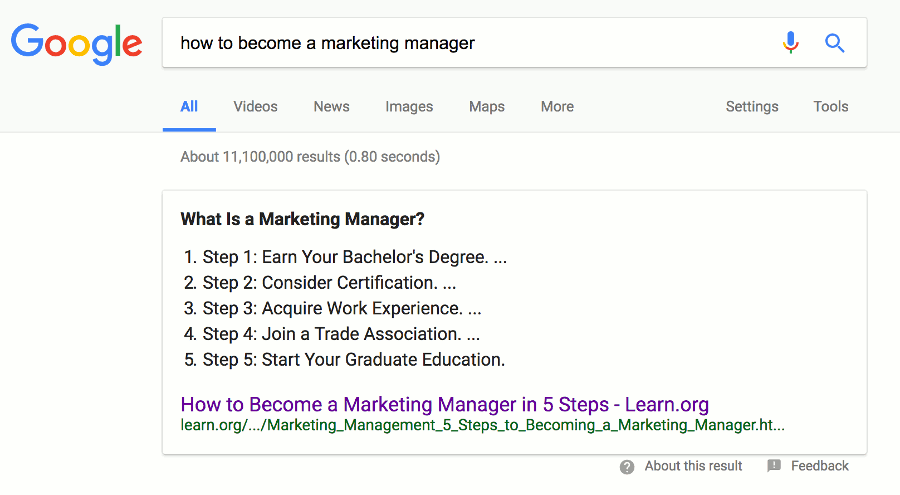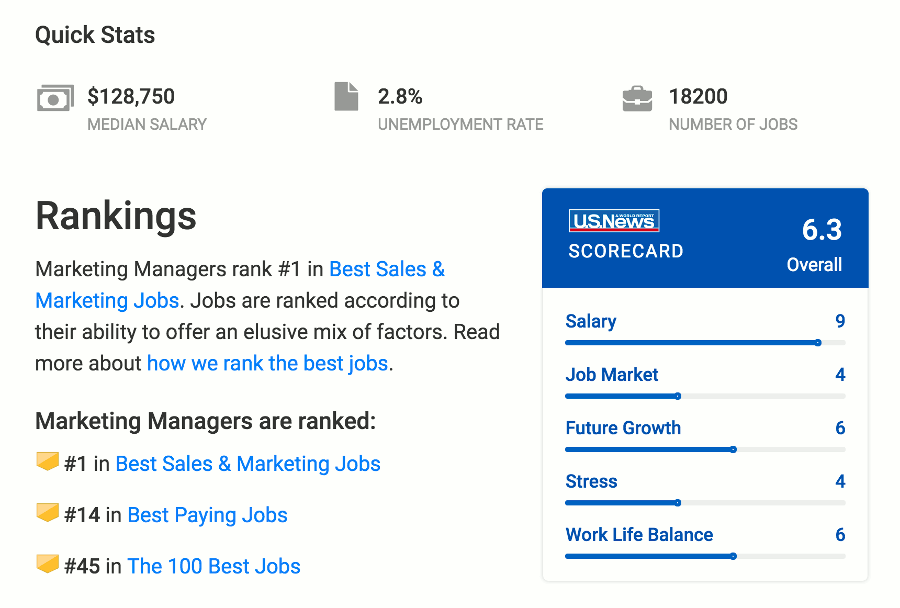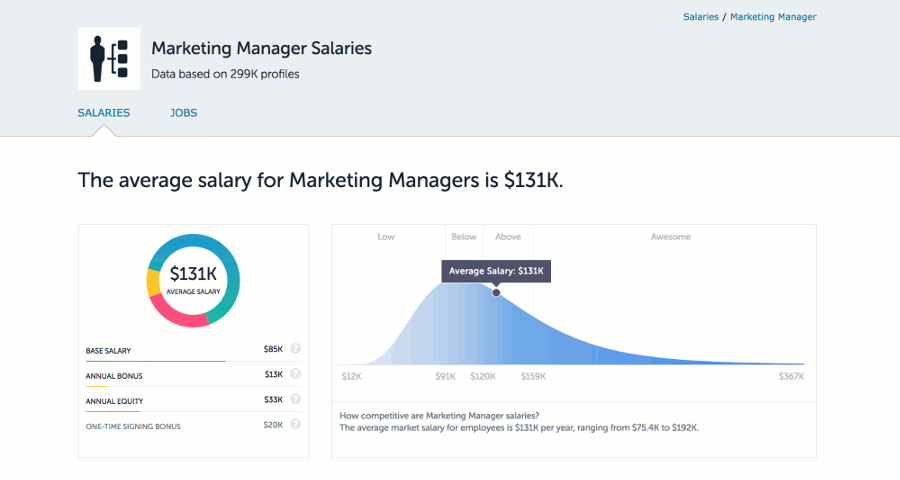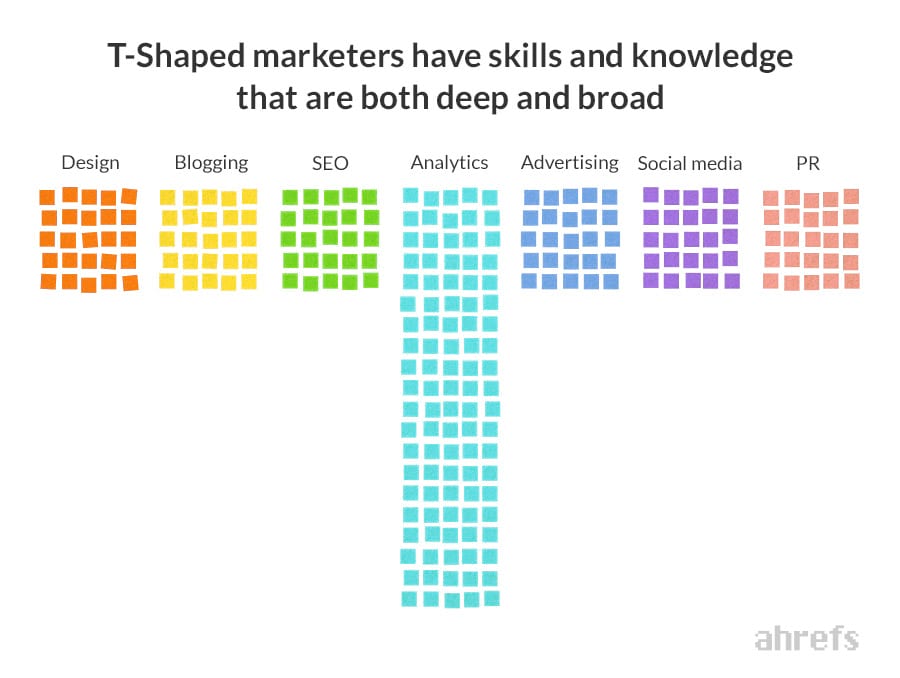Step 2: Consider Certifications. …
Step 3: Acquire Work Experience. …

According to Google, these are the first three steps to becoming a marketing manager. While Google may not be wrong, its answer is a bit outdated and presumptuous.
For starters, any experienced marketer knows that you don’t need a Bachelor’s degree to become a marketing manager today. Also, there’s certainly not one, linear path that all marketing managers take. In fact, there’s an infinite number of ways to get there.
But instead of giving you analysis paralysis by listing all of the different ways to become a marketing manager, we decided to elaborate on the fastest way to become one.
If you’re new to the world of marketing, you probably have a few questions like:
- Money. Do marketing managers make a good living?
- Fun. Is being a marketing manager fun?
- Time. How long will it take to become a marketing manager?
- Requirements. What are the requirements to become a marketing manager?
- Education. Do I need a degree to succeed as a marketing manager?
- Certifications. Are there any certifications I should take to become a marketing manager?
- Expectations. What skills and experience do senior marketers expect marketing managers to have?
In this resource, we address all of the above.
To be objective, we reached out to experienced marketers in senior-level positions to answer our questions. Without their contributions (see below), we wouldn’t have the phenomenal resource we have today.
Everett Sizemore - Director of Marketing @ Inflow
Eli Schwartz - Director of Marketing @ SurveyMonkey
Katie Hurst - Marketing manager @ OpenSesame
Rod Austin - Director of Marketing @ Pagely
Szymon Klimczak - Chief Marketing Officer @ LiveChat
Kevan Lee - Director of Marketing @ Buffer
Dan McGaw - Chief Marketing Officer @ Effin Amazing
Joe Pulizzi - Founder @ Content Marketing Institute
Clay Heller - marketing director @ Photobooth Supply Co
Let’s dive in!
Why become a marketing manager?
Do you even know why you want to become a marketing manager?
If you do, by all means, scroll ahead. If you don’t, get ready to fall in love because being a marketing manager is a lot of fun.
Good money
Marketing manager ranks No. 45 in U.S. News and World Report’s list of The 100 Best Jobs and No. 14 in its list of Best Paying Jobs.

Depending where you look — Glassdoor, Paysa, LinkedIn, or AngelList — salaries range from $68,000 to $185,000, with the average being around $72,000.
Easy and fast career progression
There’s no glass ceiling in marketing. So as long as you tie your salary to revenue, and get results for the business (by meeting and exceeding your KPIs), you’ll be able to continually increase your salary and move up to having a share in your company.

In-demand position
Marketing manager positions have a higher than average projected growth rate, according to both Monster and U.S. News and World Report. Therefore, it’s really not difficult to land a job as a marketing manager if you’re good.
Flexible lifestyle
Whether you want to freelance or work full-time, marketing allows you to work from anywhere in the world with the Internet connection.
It’s pretty easy to find flexible, remote marketing manager gigs all over the globe when you scour the right job sites.
Robot-proof
As of 2016, there were nearly 205,900 marketing managers, and by 2024, that number is projected to increase by nine percent.
So while everyone else’s job is getting automated by robots, marketing managers are here to stay -- for a while at least.
In fact, we only have a 1.4 percent chance of automation, which means we’re “totally safe…” for now.
Transferrable skillset
Last but certainly not least, marketing managers have rich, transferrable skillsets, meaning they have skills that are useful for just about any job -- including startup founder or entrepreneur.
Of course, it’s not all rainbows and unicorns. Being a marketing manager can be stressful because you’re directly responsible for meeting challenging KPIs. And work-life balance can tilt in the work direction often.
Don’t let that deter you though. Marketing is more rewarding than not. I’ll prove it. Here’s exactly what they do everyday.
What does a marketing manager do?
Ask a marketing manager what they do all day, and you’ll probably leave the conversation feeling very confused -- for two reasons.
- Marketers use lots of jargon.
- And marketers do a lot of different things every day.
Ask Google what a marketing manager does, and you’ll read a lot of outdated, trite answers based on what marketing managers did before the Internet existed.
So because you asked (and didn’t receive), we’re going to give you the the simplest yet most comprehensive, up-to-date answer ever to: What does a marketing manager do?
Ready?! Well, it totally depends.

It depends on whether or not you work for a large corporation or a small to medium sized business. If you work for a corporation, you’ll likely be a marketing manager who specializes in a specific channel, i.e. Paid Acquisition Marketing Manager or Social Media Marketing Manager. If you work for a startup or SMB, you’ll likely be wearing many more hats.
Instead of getting granular, we’re going to focus on the jobs every type of marketing manager does.
Marketing managers top job is to find ways to grow the business (ideas), execute those ideas (campaigns) and then analyze and report on those campaigns.
In jargon, job description speak: Implement and report on marketing initiatives.
These campaigns usually require additional resources; therefore, marketing managers do a lot of collaborating, outsourcing and managing.
“Marketing touches everything in an organization, so I have to make sure I’m connecting with the leaders of the various teams. For example, I need to be aware of the product roadmap and new features so I can schedule webinars to address questions and create new FAQ pages on the website,” Katie Hurst, OpenSesame marketing manager, said. “I also need to make sure our sales team is receiving enough relevant leads and that our content team has the tools to please our sellers.”
Which is actually a nice segway.
What do employers want in a marketing manager?
A lot of things. But first and foremost, employers want a marketing manager who can grow things.
I want a marketing manager who understands how to grow and keep an audience so that we have ongoing options to communicate directly with customers and prospects. That means understanding the messaging, the execution, the tools, and the consistency it takes to build a relationship with a group of people.
At the end of the day, marketing comes down to growth -- growing revenue by increasing customers. Increasing customers by increasing traffic, etc. In order to grow these things, marketing managers must have a foundational skillset (and toolset) under their belts. Here are the specifics.
What skills do I need?
Again, it totally depends on the size of the company. With that being said, regardless of company size, all marketing managers must have a good understanding of the entire marketing landscape.
Before we dive into what exactly those skills (hard and soft) are, keep in mind that you don’t have to be an expert in every single skill we list below. In fact, it’s best if you shape yourself like a “T” (AKA become a T-Shaped Marketer).
T-Shaped Marketers (generalists), have skills and knowledge that are both deep and broad while I-shaped people (specialists) have a deep understanding of their discipline, but not necessarily anything else.

T-Shaped marketers are an entire post in and of itself though so we won’t go deeper into it now. If you’d like to learn more, read this post on Buffer.
So let’s move on and dissect the skills (hard and soft) marketing managers must bring to the team.
Must-Have Soft Skills
When we asked CMOs and marketing directors what skills were non-negotiable when hiring a marketing manager, nearly all of them listed multiple soft skills well before they ever mentioned hard ones.
Soft skills are a combination of personal attributes that enable people to effectively navigate their environment, work well with others, perform well, and achieve their goals with complementary hard skills.
Below you’ll find a list of the most sought-after soft skills in marketing managers.
Ability to Execute
Being able to execute on a plan is one of the most important things a marketing manager can do, according to Kevan Lee, Director of Marketing at Buffer.
Has the person shown a history of executing well on a given strategy or project? Do they deliver on time? Do they deliver a high quality of work? At the marketing manager level, you’re expected to drive results with some strategic support (from a marketing director, VP, or C-level teammate, usually). Being able to execute on a plan is one of the most important things you can do.
Collaborative
Marketing managers must play well with others. Not only do they have to work within their department to get stuff done, but they are also likely going to need resources from other departments within the organization.
For example, 10x content, such as custom tools for customers, is a current marketing tactic since the rise of Product Hunt and Crew. While some marketers may dabble in HTML, SQL and CSS, most can’t build a custom tool without the help of the UX and development teams.
Being a collaborator all comes down to how much empathy you have for others. Therefore, a marketing manager should have a lot of empathy.
Empathy is important for the personal relationships you build with your teammates via 1:1s, coaching, mentoring, etc. There are lots of different interpersonal skills a marketing manager can have. If they don’t have empathy, then the other skills won’t really matter. Empathy for your teammates -- seeing things from their perspective -- is huge.
Who does a marketing manager work with?
Depending on the size of the company, your boss may be a marketing director, VP of marketing, chief marketing officer (CMO) or, at smaller businesses, the CEO or company founder.As for direct reports, a marketing manager at a startup may have none, besides perhaps an intern or two. At a larger company, you will likely have marketing assistants or associates that report to you or a team of content producers.
Fast Learner/Adaptable
Marketing managers face a lot of challenges today. One of the top ones being the ability to deal with a constant state of flux in the marketing landscape. New trends, tactics and tools seem to pop up weekly -- if not daily.
The digital marketing landscape evolves constantly, and hiring a person that can adapt to those changes (and industry changes) is critical, as that’s not an easy skill to pick up later in life.
Creative Problem Solving/Critical Thinking and Problem Solving
As we’ve mentioned in a previous post, growth hacking is just creative problem solving.
Marketing managers are faced with challenging dilemmas daily.
Why is revenue decreasing? How can we decrease our churn rate? How can I get more traffic to our site? And a lot times, you’ll have to solve these challenges with limited resources.
These are just a few of the problems that a marketing manager will need to find creative solutions for. And this leads us to hard skills.
Must-Have Hard Skills
Hard skills are specific, teachable abilities that can be defined and measured, such as typing, writing, math, reading and the ability to use software programs.
These are much easier to develop than soft skills.
There’s nothing that can’t be taught.
Although, I will add that the difficulty comes when you have to learn skills that aren’t exactly related.
Any marketing manager that I hire needs to have a strong mix of creativity and analytical abilities. I need someone that can truly understand data and then use that knowledge to develop creative marketing strategies.
So without further ado, here’s the hard skills you must learn if you want to become a marketing manager in 2017.
Analytical
The overwhelming majority of senior marketers will agree with Schwartz. They expect marketing managers to make data-driven decisions.
Metric-based decisionmaking is at the top of Austin’s list too.
You want to find someone who makes marketing decisions based on measurable numbers, not intuition.
Marketing is no longer the dark art it once was. Today, it is based on data. So you must be able to understand how to get around the latest marketing analytics tools, which we’ll mention in a latter section (stay tuned).
Once you get the data, you’ll need to know how to extract valuable insights from the data.
For example, if you see that traffic is significantly increasing while conversions are drastically decreasing, you need a red flag to go off in your head, hypotheses for why this could be happening and experiments you can run to find the solution the fastest.
Understanding your customers (Empathy)
While analytical skills are important, they’re not necessarily more important than understanding your customers. Clay Heller, marketing director at Photobooth Supply Co, offers a prime example.
Large amounts of data about our customers had always told us that they didn’t have college degrees. It didn’t tell us why. So we were dumbing down a lot of content, when really all the customer wanted was more exciting and fast paced stuff. They’d passed on college because it was boring, not because it was too difficult.
How did Heller figure this out? Because he was on the frontline, talking to customers as a tech support rep.
And all of those insights came from talking to people as a tech. It’s one of the most powerful paths you can take, and it’s something that can always make your work better. Ask the support department if you can listen in on some calls or help them write some emails. They’re always going to be happy for the help, and you can use this as a springboard for so many things. Our CEO always pays more attention when the information I bring him is straight from the people, rather than filtered through a survey.
Digital Advertising
Amongst digital marketing skills, digital advertising is the highest in demand, according to a 2017 MarketingProfs report.
Digital advertising includes paid social (Facebook, Twitter, Instagram, etc.), AdWords, retargeting campaigns and more.
Social media ads are a great place to get your feet wet because spending will likely exceed $35 billion this year, representing 16 percent of all digital ad spending globally.
And if you want to get granular, Facebook seems to be the platform of choice amongst digital advertisers, with Instagram not far behind.
As of last year, Facebook generated $6.8 billion in advertising revenue, an increase from $4.3 billion the year prior, while Instagram, which has only offered ads for two years, made an estimated $1.53 billion in revenue. That’s double the amount they made in year one.
Here’s a few things to learn about Facebook Ads, according to Jeff Bullas:
- How to extract value from Facebook Insights
- How to use the Power Editor
- How to successfully use Lookalike Audiences
- How to successfully use Custom Audiences
- What oCPM bidding is
- How to test/experiment ads
Content Marketing
The second most in-demand digital marketing skill, behind digital advertising, is content creation and curation, according to the same MarketingProfs report.
Content marketing is what I like to call nonchalant advertising. In short, content marketers create and distribute content (i.e. blog posts, ebooks, videos, visuals, and more). The content does NOT explicitly promote a company but rather it answers its target audiences questions.
The idea is, by educating your audience, instead of spamming them with promotional fluff, they’ll convert faster and become loyal ambassadors without ever directly asking.
Communication (Written and visual)
Marketing is all about successfully communicating your intended message to your target audience to get them to take a desired action.
There’s a lot of different ways to communicate today, but above all else, marketing managers need to be good writers and designers.
For instance, as a marketing manager, one day you’ll be writing copy for a landing page and then designing that landing page. The next day, you’ll be writing or editing a blog post along with creating original, well-designed images and graphics to make it visually appealing.
SEO
Think of content marketing and SEO as peanut butter and fluff (yes, fluff > jelly). Content marketing is the main attraction (the peanut butter) while SEO is the fluff added for a better experience.
Every time you publish a piece of content, you must optimize it for organic search. You do this by conducting keyword research, finding a focus keyword, and writing SEO-optimized title tags, meta descriptions and URLs.
Outreach
Marketing managers are required to be phenomenal relationship builders, i.e. they need to be good at outreach.
Outreach involves contacting another blog editor or site owner with an “ask.” Maybe you want a backlink to your site or maybe you just want an editor to accept your guest post -- both are examples of “asks” because you’re asking someone else for something that benefits you.
Branding and Storytelling
Ninety-two percent of consumers want ads that read like stories, saying they trust earned media above all other forms of advertising. So in order to land earned media and please consumers, you need to tell a good story above all else.
It’s only after these non-negotiable skills do hiring managers, like Inflow’s Director of Marketing Everett Sizemore, begin to look at platform-specific skills, like software and tools, when hiring a marketing manager.
Are there any requirements?
Besides meeting (and exceeding) KPIs? Nope, there is no glass ceiling in marketing.
But what about a college degree? And are there any certifications you should take? For those of you persisting, here are your answers.
Education
Experience by far trumps education.
The problem with education today is that it doesn’t teach modern marketing practices. It teaches you outdated marketing theories.
Most marketing manager positions list at least a Bachelor’s degree as a requirement in their job descriptions, but it’s really just a filter. If a candidate has a lot of great experience under their belt, then the education requirement will be dropped.
Certifications
Apart from certifications that Google provides on the various marketing tools they have, the most widely recognised certification is probably the one by HubSpot.
There is also Copyblogger’s Certified Content Marketers certification.
What software and tools does a marketing manager use?
One of my favorite parts of being a marketer is using the latest and greatest software and tools to help me do things like, spy on my competitors, schedule content ahead of time, or hell, automate specific processes entirely.
“There’s an app for that,” has never rang more true than today. In fact, Chief Marketing Technologist Scott Brinker, said (in 2014!) that marketers use more than 100 software programs on a regular basis. Brinker’s argument is pretty good:
At the top of the pyramid, there are applications that we naturally think of as “marketing software” such as CRM (probably with extra “apps” installed), marketing automation, web analytics (likely several), your website CMS, possibly a separate blog system like WordPress. If you’re using WordPress, how many plugins do you have installed? Each one is small software program. On your website or blog, perhaps you’re running little scripts (i.e., software) for A/B testing, mouse tracking, social sharing, personalization, live chat, discussion threads, feedback surveys, calling tracking, ad retargeting, etc. — possibly all coordinated through a tag management system. Ever run an SEO audit or a security analysis on your website? More software.
Below we detail the different types of software and tools marketing managers should be familiar with and provide a few specific examples for each.
[Marketing] Automation
The goal of automation software is to automate repetitive tasks, such as sending emails and scheduling lead nurturing campaigns.
Popular Automation Tools:
- HubSpot
- ActiveCampaign
- Zapier
- InfusionSoft
- Marketo
- And more
SEO
SEO tools are probably the most exciting of all because there is so much you can do with them. Marketing managers use SEO tools for link building, technical SEO, keyword research, rank tracking, content optimization and backlink analysis.
Here’s some of the most popular SEO tools:
- Ahrefs
- Moz
- SEMrush
- Majestic
- Screaming Frog
- DeepCrawl
Email Marketing
Marketing managers use email marketing software to send one-to-many emails. While there are various levels of email marketing software -- from simple to advanced -- Mailchimp is by far the market leader in regards to email marketing software market share.
Other email marketing tools include:
- Newsletter software (Constant Contact, Aweber, Campaign Monitor)
- Drip email software (Drip)
- Form capture tool (Sumo, Leadpages)
Check out Siftery to see these tools broken down into more granular sub-categories.
Social Media Marketing
The most important social media marketing tool in your arsenal is your social media scheduling tool. Buffer and Hootsuite are the market leaders in this category.
Other types of tools you’ll want to know how to use include:
- Social media influencer marketing (i.e. BuzzSumo)
- Social media monitoring (i.e. Mention)
- Social media ad management (i.e. Adespresso)
- Social media analytics (i.e. BuzzSumo)
- URL shortener tools (i.e. Bitly)
- Social media amplification (i.e. Quuu)
Content Marketing
Because content marketing relies on SEO, social media marketing and email marketing, you’ll need all of the tools above plus some writing tools to plan, publish, manage and promote your content.
- Content management system (i.e. WordPress)
- Editorial calendar planning (i.e. Trello)
- Writing and editing (i.e. Grammarly, Google Docs)
- Syndication (i.e. Medium)
- Outreach (i.e. Reply.io, Mixmax)
Design
As we mentioned above, marketing managers should have an eye for good design because one of their main responsibilities is executing marketing campaigns, which will require marketing collateral.
Here’s a few common design tools marketing managers use:
- Landing page software (i.e. Instapage, Leadpages)
- Images for social media, digital ads and blog posts (Canva, Adobe Illustrator and Photoshop, Sketch)
Marketing Intelligence
Marketers are good at finding information (i.e. researching). On any given day, they’ll need to:
- Find an important person’s [correct] email address (hunter.io)
- Know if someone opened (and clicked) your email (Yesware)
- Know what their users are doing on their website (Hotjar)
- Find more information on someone (CrystalKnows, Clearbit)
- Learn more about their competitors (Datanyze, Similarweb, Audiense, Spyfu)
- Personalization/Testing (Optimizely)
PR/Outreach
Not only do marketing managers have to produce content but they have to get eyeballs on that content. One way they do this is through “PR” and outreach.
Here’s a few popular PR tools:
- Conduct outreach at scale (Buzzstream, Reply.io, Mixmax)
- Find people’s emails (hunter.io, headreach)
- Get earned media coverage (Help a Reporter Out or HARO)
- Receive brand alerts (Ahrefs, Google Alerts, Mention)
If you want to learn about even more marketing tools, here’s a post for you to Pocket.
How do you measure the success of a marketing manager?
This is the section where marketing can get messy (and stressful) because marketing is directly tied to the results of the company. At least they are at LiveChat (and the other companies we interviewed for this post).
Klimczak defines KPIs that connect to the results of the business. On their team, every person has their own focus, so it’s relatively easy to where the company is progressing and where it’s plateauing.
LiveChat’s company-wide KPI is customer growth rate, which they publicly report on a monthly basis.
It’s very easy to translate the work and results of every person on the marketing team to the results of our company. Incoming traffic, number of trial accounts, quality of trial accounts - these are the KPIs we operate on in terms of analyzing the results at LiveChat.
Key performance indicators (KPIs) will vary from company-to-company.
For instance, a company with only one marketing manager might have that manager focused on number of new users or leads, whereas a company with multiple marketing managers will likely have each manager solely responsible for blog traffic or brand awareness/reach, Lee, said.
In terms of direct KPIs, that is likely to range quite a bit, company-to-company. For instance, a company where there’s only one marketing manager might ask that manager to be accountable for acquisition of new users or leads. A company with multiple managers might have a manager who is solely responsible for blog traffic or brand awareness/reach. At the very least, I’d recommend reviewing your data weekly, and then chatting with your lead about KPIs no less than every four weeks.
How do you become a marketing manager in the 21st century?
To become a marketing manager, the first place you should start is making sure you are marketing yourself correctly. This will not only give you relevant experience in marketing, but will bolster you are someone who knows their shit. I would also recommend volunteering in marketing positions for non-profits. I used this tactic to build my experience and others trust in my skills.weeks.
Don’t take his advice the wrong way though. If you can land a marketing job now, go get one. Start wherever you can to gain experience and build from there.
Final Thoughts
Now, it’s your turn to get the attention of companies throughout the world.
There’s no reason you can’t. We’ve explained how to become a marketing manager in the fastest way possible. The rest is up to you.
All you have to do is start learning and gaining experience.
The question is: Will you?










